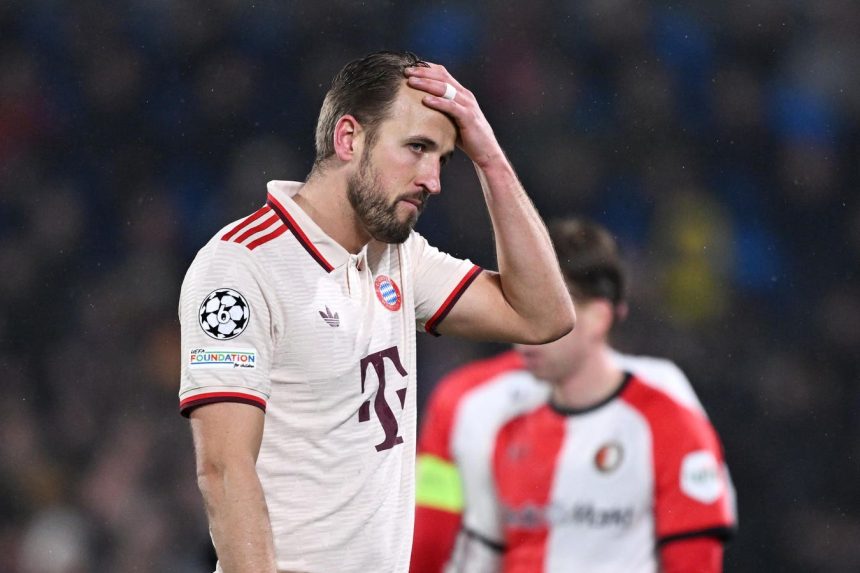Bayern Munich’s recent 3-0 defeat at the hands of Feyenoord in the Champions League, while not jeopardizing their progression to the knockout stages, has exposed vulnerabilities and ignited concerns about their current form. Despite dominating possession and boasting a superior expected goals (xG) tally, Bayern’s profligacy in front of goal and defensive lapses allowed Feyenoord to capitalize on limited opportunities, securing a comfortable victory. While the defeat stings, Bayern are guaranteed to advance, albeit potentially through the playoffs rather than directly to the Round of 16.
The match highlighted Bayern’s over-reliance on Harry Kane for goals. While Kane’s overall statistics for the season remain impressive, with 22 goals and 10 assists in 24 games, a significant portion of his goals have come from penalties. His recent drought from open play has coincided with a dip in Bayern’s attacking potency, leaving them vulnerable against well-organized defenses. While other attacking players, such as Jamal Musiala and Leroy Sané, have created chances, they haven’t consistently converted them, placing undue pressure on Kane to deliver. Against Feyenoord, Bayern’s attack appeared toothless, failing to capitalize on numerous opportunities, while their opponents demonstrated clinical efficiency, scoring three goals from just three shots on target.
Compounding Bayern’s attacking woes are recurring defensive frailties. All three of Feyenoord’s goals stemmed from counter-attacks, exposing Bayern’s vulnerability to swift transitions and their struggles with maintaining a high defensive line. Individual errors, such as those committed by Min-Jae Kim and Raphaël Guerreiro, contributed directly to goals, but coach Vincent Kompany rightly emphasized the collective responsibility for defensive lapses, highlighting the need for a more cohesive approach from the entire team, starting with the forwards. The ease with which Feyenoord exploited the Bayern defense raises questions about the team’s tactical setup and whether Bundesliga opponents might adopt similar strategies in the future.
The loss to Feyenoord serves as a wake-up call for Bayern Munich. While they have shown periods of dominance this season, their inconsistencies and reliance on individual brilliance rather than cohesive team play have left them susceptible to upsets. The lack of consistent goal-scoring from open play outside of Kane, coupled with defensive vulnerabilities, presents a significant challenge for coach Kompany to address. The upcoming matches against Freiburg and Slovan Bratislava offer opportunities for Bayern to regain their momentum and address these issues.
Looking ahead, Bayern must find a way to reignite their attack and rediscover their clinical edge. Reducing their dependence on Kane for goals is crucial, and other attacking players need to step up and contribute more consistently. This requires not only improved individual performances but also a more cohesive attacking strategy that creates higher-quality chances. Defensively, Bayern needs to address their vulnerability to counter-attacks and improve their organization at the back. Whether they can make these necessary adjustments will determine their ultimate success in both the Champions League and the Bundesliga.
While the defeat to Feyenoord was undoubtedly a setback, it also presents a valuable learning opportunity. Bayern’s players and coaching staff must analyze the match, identify the areas that need improvement, and work collectively to rectify them. The team’s resilience and ability to bounce back from adversity will be tested in the coming weeks. The positive attitude expressed by players like Joshua Kimmich, emphasizing the team’s togetherness and determination to react positively, suggests a willingness to address these challenges and strive for improvement. However, whether that translates into tangible results on the field remains to be seen.



